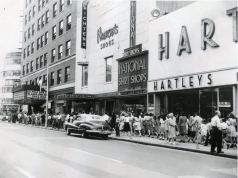After a night of watching the latest episode of “Last Week Tonight” and several other videos emphasizing the importance of social distancing, my anxieties about working amongst the public have only heightened.
I couldn’t have been the only one. A couple of people assigned to Precinct 422 for the primary election Tuesday didn’t show up.
This was my fourth election working as a poll worker, tasked with checking in and guiding voters through the process. There was a clerk and assistant clerk to oversee us, an election specialist to run the machines and a poll deputy to direct voters outside.
in and guiding voters through the process. There was a clerk and assistant clerk to oversee us, an election specialist to run the machines and a poll deputy to direct voters outside.
All but two of us were old enough to have grandchildren. All but two were women.
We arrived at 5:30 a.m. to the small building at the far end of a courtyard at the Everglades K-8 Center in Westchester. It is composed of two classrooms, one of which had been repurposed to serve as a polling location. We spent the previous day assembling the privacy booths, moving chairs and tables and setting up the machines.
There was a hand sanitizer on every table. We’d been encouraged to bring some if we could since the clerk was unsure whether she’d be able to bring us any, thanks to the shelves being cleared of them at most places. We were asked to wear gloves.
It was hardly half an hour before conversation shifted to the elephant in the room. The clerk lists items that are out of stock at her local Walmart: milk, food, water and toilet paper. She ponders aloud about whether the country will experience a shutdown by the end of the week.
The conversation drifted away from and back to COVID-19 several times throughout the day. Consistently and inevitably. None of us discussed the election.
Six hours in, we’d had 30 visitors. I had sorted and deleted over 500 pictures on my phone. I had also read two more chapters of “Tuesdays With Morrie” by Mitch Albom. A disagreement broke out between two poll workers about who is to blame for the situation. The clerk mediated and reminded everyone that this is a time to work together and pull through.
As more people came, I mostly thought about when I could go home. We had minor complications with voters every so often and each time it would snap me back to where we were and what we were doing.
‘Oh right.’ I thought. ‘There’s an election with candidates and everything going on.’
At previous elections, we never really lost sight of the big picture. Although we would avoid discussing details, there was always an atmosphere of rapt attention towards the process we were playing active roles in. Poll workers quietly counted the number of votes and shared their opinions in hushed tones.
This time around we were all a bit distracted. No one looked up any predictions on the results. Instead, someone would occasionally announce that a friend or family had sent them updates or speculations about which places would or would not be staying open.
The polls closed at 7 p.m. and by a bit after 8 p.m. we had finished breaking down the room and putting everything back where it needed to go. The clerks and the election specialist handled the bureaucratic process of assuring all the correct information got reported. The rest of us headed home. At the end, 67 people had voted at the precinct, about half of what would be normal.
I didn’t even think to check for election results until the next day. Something tells me many others didn’t either.
(Editor’s note: This story is part of a series describing the transformational effect of coronavirus on the young. For more stories, click here.)
































